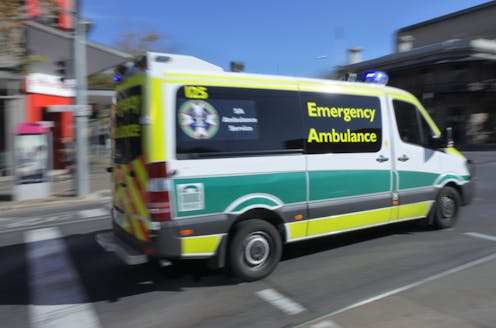What is the 'unified protocol' for PTSD? And how can it help?
- Written by David Berle, Associate Professor in Clinical Psychology, University of Technology Sydney

Many of us[1] experience at least one potentially traumatic event in our lifetime. These can include accidents, natural disasters, exposure to war and combat, or physical and sexual assault.
Humans are resilient and most adjust well afterwards. However, some people may develop post-traumatic stress disorder (PTSD) when emotional difficulties persist.
The most common symptoms[2] include[3] re-experiencing the trauma through nightmares and upsetting reminders of the event; avoiding reminders of the event; chronic feelings of being alert and “on guard” for danger; and profound changes to beliefs about themself, the world and the future.
The good news is we have a number of evidenced-based treatments for PTSD. And one showing promise is the “unified protocol”.
Trauma-focused treatments
All common first-line PTSD treatments involve some sort of “processing” of the trauma memory. We call these treatments “trauma-focused[4]”.
By repeatedly recalling the memory of the trauma in a safe and controlled way, the person can start to see that event as having occurred in the past; it’s no longer happening in the “here and now”. The person also learns the memory itself is not inherently dangerous or something to avoid.
Read more: Explainer: what is post-traumatic stress disorder?[5]
When PTSD isn’t the only problem
However, not everyone gets better[6] with “trauma-focused” treatment. Treatment seems to be successful for a third of people, partially successful for another third and the rest may not significantly improve.
Most people[7] with PTSD also experience depression, high levels of anger, severe anxiety, or a combination of these. Substance use is also common. And these other difficulties reduce the chances[8] of standard treatment working.
So, in recent years, we’ve seen the emergence of “transdiagnostic” therapies. These aim to address common underlying processes thought to contribute to a wide range of emotion-related disorders. These approaches may be particularly useful for people who have more than one emotional disorder.
This is where the “unified protocol” for treating emotional disorders comes in.
A review[9], led by our team at University of Technology Sydney, indicated people with anxiety disorders and depression can expect significant improvement from completing the structured and skills-based modules that form the treatment.
These modules include a range of emotion regulation skills to help the person accept or reappraise negative emotions. People do not eliminate these emotions entirely, but learn to respond to them in the most effective way possible.
Read more: There's a strong link between anxiety and depression, and sleep problems, and it goes both ways[10]
How about the ‘unified protocol’ for PTSD?
Earlier this year, a randomised controlled pilot trial[11] led by our team at Phoenix Australia, University of Melbourne, provided hope the “unified protocol” might also help people with PTSD.
The trial included 43 adults who had been through a traumatic event and who had developed post-traumatic stress symptoms, many with a PTSD diagnosis. Some also had depression or anxiety.
People with post-traumatic stress symptoms who had 10-14 hour-long sessions of the “unified protocol” once a week had fewer PTSD symptoms at the end of treatment, and at six months after the treatment, than people who were free to choose any psychological or pharmacological treatment.
We think people in the “unified protocol” group did better because this treatment may address PTSD in a different way than directly targeting the trauma memory.
In other words, the “unified protocol” may help the person better regulate emotions and reduce them avoiding distressing emotions. So PTSD symptoms may improve without a specific focus on the trauma memory.
Read more: What makes a good psychologist or psychiatrist and how do you find one you like?[12]
However, we have still have much to learn. That’s why our research team at the University of Melbourne is conducting a larger randomised controlled study[13].
This will hopefully tell us which people might better respond to the “unified protocol” and which to trauma-focused treatment.
Having a range of treatments for PTSD, which work in different ways, can potentially help the many Australians[14] with PTSD. Ideally, this will allow clinicians and their clients to make an informed decision about which treatment is best.
If this article has raised issues for you, or if you’re concerned about someone you know, call Lifeline on 13 11 14. More information about PTSD and support is available from Phoenix Australia[15]. The Australian Clinical Psychology Association provides a free Find a Clinical Psychologist[16] service. Or you can see your GP for other referral options.
References
- ^ Many of us (journals.sagepub.com)
- ^ common symptoms (www.appi.org)
- ^ include (www.beyondblue.org.au)
- ^ trauma-focused (www.frontiersin.org)
- ^ Explainer: what is post-traumatic stress disorder? (theconversation.com)
- ^ not everyone gets better (www.sciencedirect.com)
- ^ Most people (www.psychiatrist.com)
- ^ reduce the chances (www.sciencedirect.com)
- ^ review (www.sciencedirect.com)
- ^ There's a strong link between anxiety and depression, and sleep problems, and it goes both ways (theconversation.com)
- ^ randomised controlled pilot trial (onlinelibrary.wiley.com)
- ^ What makes a good psychologist or psychiatrist and how do you find one you like? (theconversation.com)
- ^ larger randomised controlled study (www.phoenixaustralia.org)
- ^ many Australians (www.abs.gov.au)
- ^ Phoenix Australia (www.phoenixaustralia.org)
- ^ Find a Clinical Psychologist (acpa.org.au)
Read more https://theconversation.com/what-is-the-unified-protocol-for-ptsd-and-how-can-it-help-162435

















